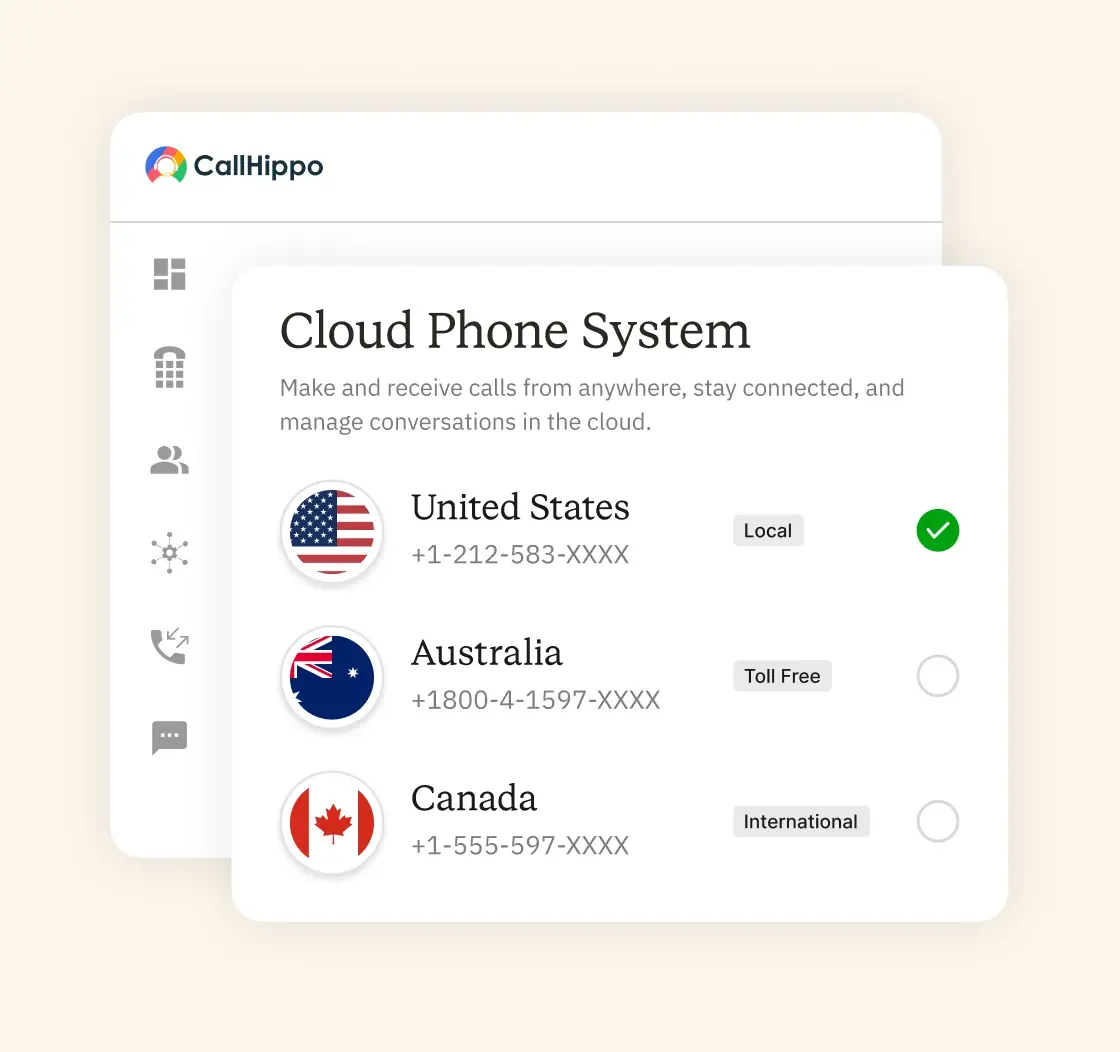Get a Cloud Phone System
Running a business means dealing with phone calls, messages, and communication channels every day. CallHippo’s cloud phone system lets you and your team handle everything from one place. No more missed calls or transfer issues.
- Call forwarding and routing work exactly how you need them to.
- You get calls, texts, and voicemails in one unified communications platform.
- Stay connected from anywhere using the mobile app on your phone or tablet.

How Do Cloud Phone Systems Work?
Cloud phone systems use your internet connection for phone calls instead of traditional phone lines. Someone dials your business phone number, and the call goes through cloud servers to your device, your computer, laptop, or mobile device. You don’t need physical phone lines or desk phones in your office. Just need a stable internet connection.
These cloud-based phone solutions include call forwarding, voicemail, IVR, and call recording. Everything runs from the cloud. You and your team log in from anywhere and use the same business number to handle incoming calls from different locations. Updates and maintenance happen automatically through Internet Protocol technology. Your business stays connected without tech problems.
Search for a Virtual Phone Number for Your Business
Find the ideal virtual business phone number to streamline your communication and improve customer interaction.
Local
Toll-free
Mobile

What are the Benefits of Cloud-Based Phone Systems?
Cloud-based phone systems help you manage business communications better. Lower costs, better flexibility, and features that keep your team connected from anywhere.
Stay connected anywhere with the desktop app or mobile device. Cloud-based phone systems make remote work simple. Access calls, messages, and voicemails from whatever device you're using.
You save money without expensive hardware or maintenance bills. Cloud-based phone solutions run online and cost less than traditional phone systems.
Add or remove users when your business changes. Cloud phone system features scale fast without extra equipment or dial plans.
See how your calls perform and what customers need. Cloud phone systems show detailed reports on call volume, inbound calls, and call monitoring. Better data for better decisions.
Your business gets encryption, secure servers, and compliance standards. Cloud-based phone systems keep your calls and data private.
Set up is quick. Dashboards are simple. Your team starts calling and messaging without being tech experts.
What are the Key Features of a Cloud-Based Phone System?
A cloud-based phone system has features that make communication easier and help your team work better.
Never miss customer messages. Voicemail stores calls so you can listen and respond later. Voicemail transcription lets you read messages fast.
Send and receive business texts from your phone system. SMS messaging makes communication faster and more personal. Builds better customer connections.
An auto attendant or interactive voice response greets callers with a menu. Guides them to the right person. Saves time and reduces transfers.
Call forwarding sends incoming calls to another number or device. You're always reachable when traveling or working remotely.
Save conversations for compliance, training, and performance review. Improves quality and keeps accurate records.
Call routing sends incoming calls to the right department automatically. Faster service and better efficiency. Ring groups make sure calls reach your team.
Keeps callers entertained while waiting. Customize messages or music during business hours to reduce frustration.
Call queues organize callers during busy times. Everyone gets treated fairly. Fewer dropped calls and better service.
Pricing
- 1 Free Phone Number
Toll-free number not included.
- Free WhatsApp Business API
- Voicemail
- Click To Dial
- AI Global Connect
Identify phone number's timezone before a call
- SMS (Text messages) & MMS
- Everything in Basic + Telephony
-
Unlimited Minutes (Includes Both Landline & Mobile Calling)
Free minutes are shared by all account users. Calling on special and premium numbers are excluded.
- 100 SMS (Text Messages)
Standard A2P charges apply.
- Basic Report Analytics
- Everything in Starter +
-
Unlimited Minutes (Includes Both Landline & Mobile Calling)
Free minutes are shared by all account users. Calling on special and premium numbers are excluded.
- 500 SMS (Text Messages)
Standard A2P charges apply.
- Call Recordings
- AI Reports / Analytics
Smart reports that summarize user & call activity.
- Everything in Professional +
-
Unlimited Minutes (Includes Both Landline & Mobile Calling)
Free minutes are shared by all account users. Calling on special and premium numbers are excluded.
- 1000 SMS (Text Messages)
Standard A2P charges apply.
- Dedicated Account Manager
- Custom Integrations
- Single Sign On (SSO)
Securely log into multiple apps with one set of credentials.
Cloud Phone System vs. Traditional Phone System
Cloud phone systems and traditional phone systems work differently. Here’s the comparison.
| Feature | Cloud Phone System | Traditional Phone System |
|---|---|---|
| Setup | Quick setup. No bulky hardware or desk phones. | Heavy hardware, IP phone system, complex installation. |
| Cost | Low upfront cost. Affordable pricing plans. Real cost savings. | High upfront costs. Ongoing maintenance expenses. |
| Scalability | Add or remove users easily. No need to touch phone lines. | Need new hardware and a technical setup for more lines. |
| Accessibility | Access anywhere with internet. Works on mobile device, desktop app, or tablet. | Limited to traditional desk phones. Can't work outside office. |
| Maintenance | Provider handles updates automatically. | Manual upgrades. Need IT support constantly. |
| Features | Advanced call management features like voicemail, IVR, call routing, call monitoring, analytics, and integrations. | Basic calling. Mostly voice calls and voicemail. |
| Mobility | Perfect for remote and hybrid teams working from different places. | Fixed to office location. Doesn't work for remote teams. |
| Security | Encryption and compliance through cloud-based solutions. | Security depends on physical system. Limited protection. |
| International Calling | Cost-effective plans. Unlimited calling options globally. | Expensive international rates. |
| Integration | Connects with CRM, helpdesk, Microsoft Teams, Zoom Phone, and other business tools. | No integration with modern software. |
How Do You Know if Your Business Needs a Cloud-based Phone System?
If it’s a small business and it is used to missing calls, has issues with remote work, and can’t multitask communication channels efficiently, it must consider cloud telephony. It offers benefits such as cost savings, flexibility, and advanced call management features that keep teams, customers, and devices connected. Cloud PBX serves you better in contact center situations or scenarios where call volume is high.
What are the Disadvantages of Cloud-based Phone Systems?
Internet Dependency and Call Quality Issues
The biggest problem with cloud-based phone systems is internet dependency. Poor connectivity or network outages mean your phone calls drop or won’t connect. Say you run a retail store and use cloud phones during business hours, you lose customer calls when the internet goes down. Heavy bandwidth usage from video meetings or video conferencing affects voice quality too. Delays and distorted audio frustrate you and customers.
Cost and Security Challenges
Cost and security create challenges sometimes. Basic pricing plans are affordable, but advanced features like call recording, analytics, or integrations cost extra. Monthly expenses increase as you scale. Growing startups notice this. You also face security risks if your business voip provider doesn’t follow strict standards. Without proper encryption and compliance, customer data could be exposed. Choose trusted call center software providers like CallHippo to minimize risks with strong security and industry compliance.
Step-by-Step Guide to Migrate to the Cloud Phone System
Moving to a cloud phone system seems tough, but simple steps make it easier. With the right plan, you transition smoothly.
Evaluate Business Needs
Look at your existing business phone number setup. Find what doesn’t work. Outline your goals. Figure out why moving to a cloud-based phone system helps your operations. Think about whether you need instant messaging, voip calling, or a unified communications platform.
Select a Provider
Research trusted call center software providers like CallHippo. Compare their calling features, pricing plans, scalability, and support. Pick the best phone solution for your needs. Check voip providers and their cloud solution options carefully.
Plan Migration Process
Create a migration plan with timelines. Include moving your virtual phone number and checking network readiness for voip technology. Identify essential features for a smooth business transition.
Configure and Set Up
Install the phone system. Set up call routing, voicemail, auto attendant, ring groups, call transfer, and integrations for your business communications needs. Make sure your team can receive calls on any device.
Train and Launch
Train your team. Run tests. Fix issues that come up. Launch your cloud phone for efficient communication across teams.
How to Choose the Right Cloud Phone System for Your Business?
Key points to consider:
- Evaluate business needs, budget, and team size before selecting a provider.
- Compare features like call routing, voicemail, analytics, call monitoring, and advanced communication tools.
- Check scalability so the phone system built grows with your business and handles increased call volume.
- Look for integrations with CRM, helpdesk, Zoom Phone, Microsoft Teams, and collaboration tools.
- Ensure strong security, compliance, and reliable performance through cloud-based solutions.
- Consider providers like CallHippo with excellent customer support and affordable pricing plans.
Get Started with a Cloud Phone System You Can Trust
Learn how to quickly buy your virtual business phone number with CallHippo and hear from satisfied customer about how we improved their communication and customer experience.


“Thanks to the CallHippo team, we were able to resolve a tough issue with flagged phone numbers. As an EdTech startup, outbound calls are crucial for us. CallHippo’s solution not only improved our attestation score but also improved our answer rates and overall customer experience.”
Frequently Asked Questions
-
A cloud phone system and VoIP technology are used in the same way, but cloud-based solutions like CallHippo offer more than internet protocol calling. You get advanced features, call routing, analytics, integrations, and scalability. It's a complete unified communications platform, not just basic voip calling technology.
-
Cost depends on the provider and features you pick. CallHippo offers flexible pricing plans starting at affordable per-user rates. Works for startups and enterprises. No heavy hardware investments means you save money while getting powerful calling features.
-
Yes. With CallHippo's cloud phone, you keep your existing business phone number through number porting. Maintains continuity for customers. No disruption. You transition smoothly while upgrading to advanced features from the cloud solution.
-
Number porting timelines depend on the carrier, but CallHippo usually does it within two or three business days. The team makes sure everything goes smooth migration. While switching from a traditional phone system to the cloud, your business communications experience zero downtime.
-
Yes. The best providers, like CallHippo, follow industry standards. End-to-end encryption, secure servers, and certifications like PCI and HIPAA make sure that your business communication and customer data remain safe and protected.
-
Of course. CallHippo's virtual phone system integrates with key business tools such as Salesforce, HubSpot, Microsoft Teams, and more. The integrations streamline the workflow processes, provide a centralized customer data source, and help boost productivity by connecting communication with your CRM and collaboration platforms.
-
CallHippo’s Cloud Phone System uses AI to make business communication smarter and more efficient. It tracks the call data, so you can easily monitor performance and spot patterns. This helps you see what is working and where improvement is needed. Moreover, AI features like sentiment detection help you understand the emotions of customers better during calls. With this, you tend to respond better and build stronger relationships. Intelligent call routing also saves time as it connects people to the right person instantly. Over time, the system learns from every interaction. You get better insights, and it predicts what the customer actually needs.
-
Yes, you absolutely can keep your existing business phone number when you switch to CallHippo. This process is called number porting, and it is very simple. You just need to share your basic details with the CallHippo team, like your current account number and billing address. Once verified, they will start to transfer your number from your old provider to CallHippo. It is important that you don’t cancel your existing plan during this process, as during the porting the number should stay active. Usually, it takes about a week or two for the transfer to complete. And once it is done, your number will work perfectly on the cloud system - just like before, only smarter.
-
Let’s first talk about the pros. Cloud phone systems come with several advantages. They are easy to set up, no heavy hardware is required, and they are much more affordable to maintain than traditional systems. Everything runs online, and your team can make and receive calls from anywhere. This system is ideal for remote or hybrid work setups. Another big plus is flexibility. You can scale your plan up or down based on your business needs. Along with this, the updates happen automatically. This means you are always using the latest tools without having to put any extra effort. Now, a disadvantage is that they do depend on a stable internet connection. If your network is weak, then the quality of your call may drop. So, for this you always need to have a reliable WiFi or mobile data network.
-
An on-premise phone system is installed and managed within your office. In this, you need physical hardware, regular maintenance, and an in-house IT team to handle updates or technical issues. It does give you full control, but it also comes with higher upfront and operating costs. A cloud-based phone system runs entirely online. You don’t need any heavy equipment - just a device and an internet connection. Your provider handles updates and system maintenance. Because of this, cloud systems are easier to manage and more affordable. You can also access from anywhere. They are perfect for modern teams that value mobility and flexibility.
-
Most modern SIP-enabled desk phones are compatible with VoIP systems. Popular brands like Yealink, Polycom, and Cisco are great examples - they are designed to connect directly to the internet or use old phone lines. These phones can easily be configured to work with CallHippo’s Cloud Phone System. If you already have the phones that support VoIP, then you likely won’t need to replace them. You can simply adjust a few settings to get started. However, if you are not sure, it is always a good idea to check the phone’s specifications. Or contact CallHippo’s support team for quick guidance before setup.
-
Absolutely! CallHippo’s Cloud Phone System is designed to work on mobile devices. A dedicated CallHippo app is available on both iOS and Android phones. You need to first log in, and thereafter you can make and receive business calls just like you would from your office desk. On this, all your contacts, call logs, and voicemails automatically sync. So no update gets missed by you. Your business always stays active whether you are travelling or working from home.
-
It is easy to move your number to CallHippo’s Cloud Phone System. You can keep your existing business number and enjoy all the new features. Here is how the process works:
- Fill out the Letter of Authorization (LOA) and share a recent phone bill. This helps us verify that the number belongs to you.
- Our CallHippo team will connect with your current service provider and start the transfer process.
- You need to keep your old number active while the porting takes place. In case the number is not active, it cannot be moved.
- Usually, the process takes three to four weeks, depending on your provider.
Once it is done, your number will stay the same. The only difference is that it now runs on a faster and smarter cloud system.




